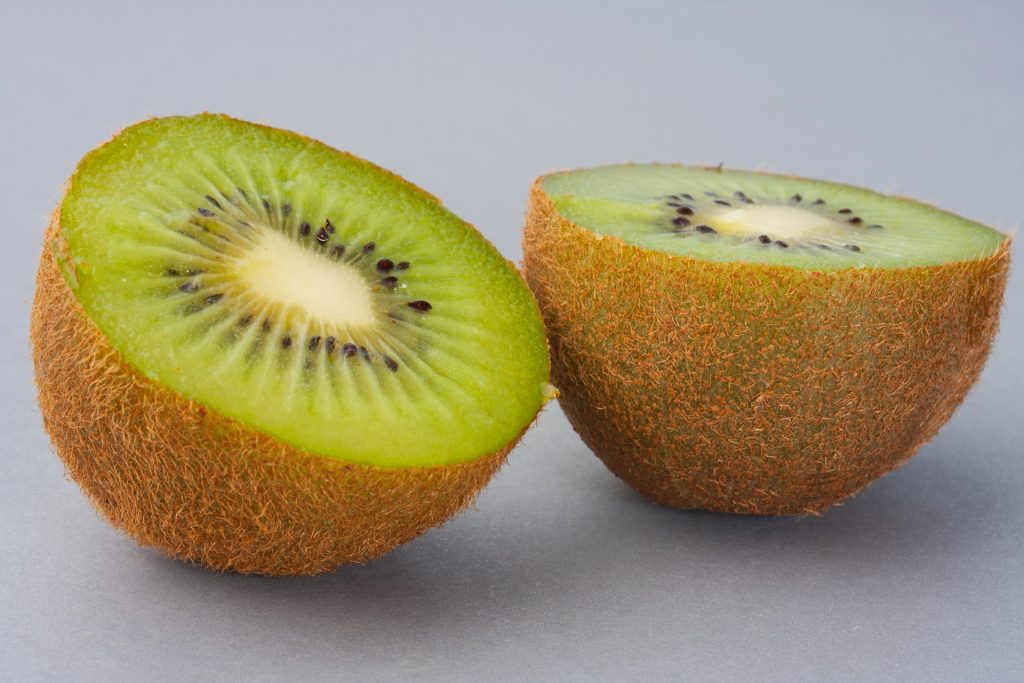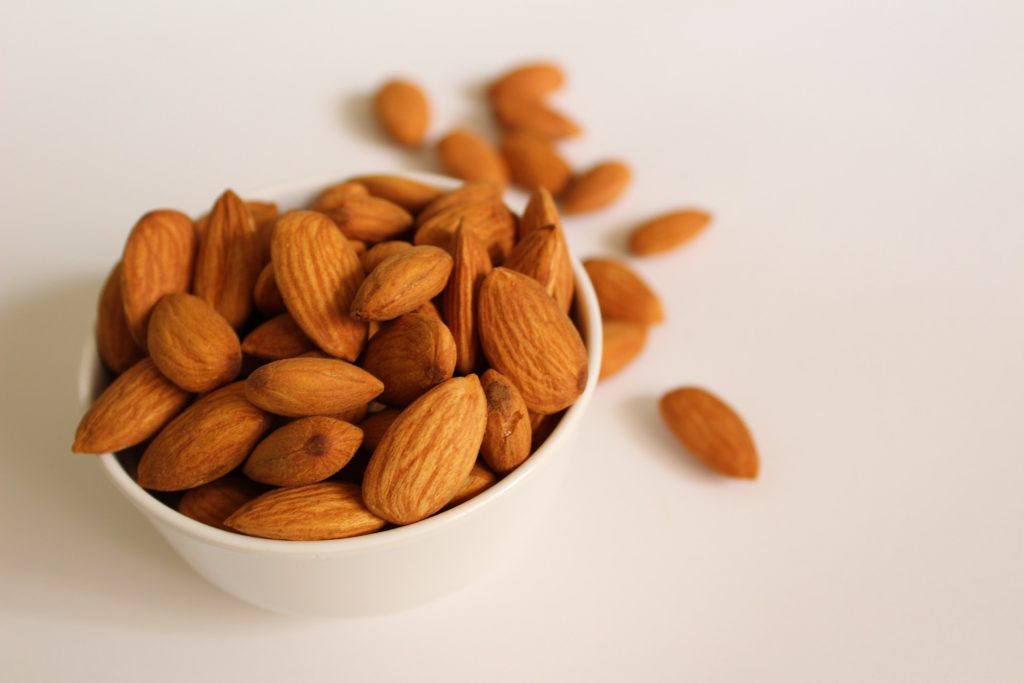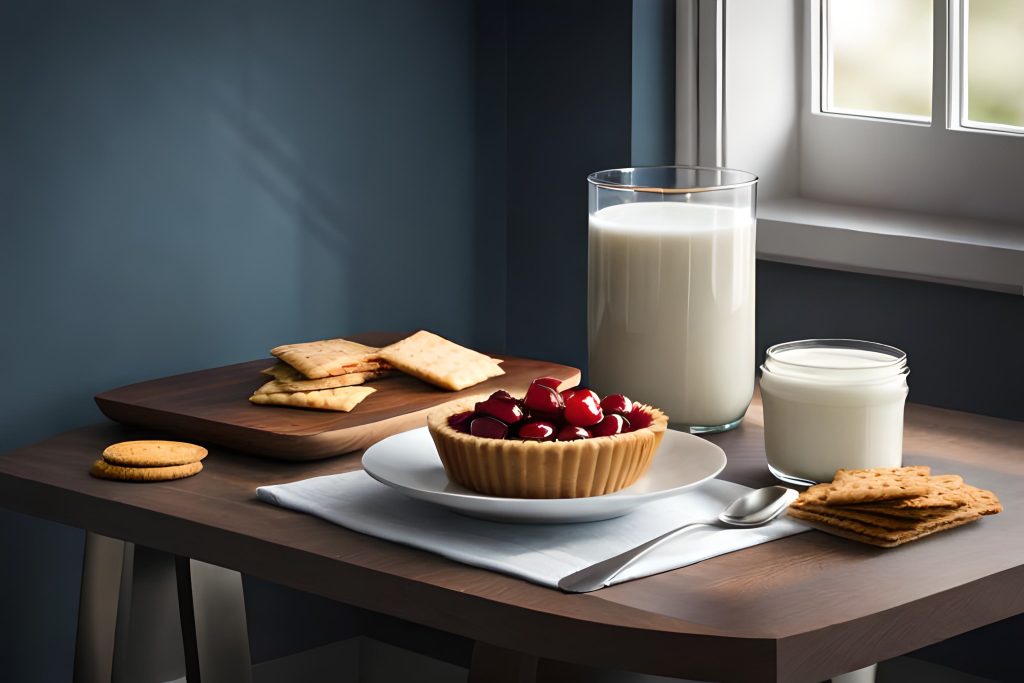Tired of tossing and turning all night? Look no further! Discover the secrets to a restful night with these foods for better sleep quality.
Research suggests that kiwi, tart cherries, almonds, walnuts, warm milk, chamomile tea, fatty fish, nuts, and rice have sleep benefits.

Kiwi provides essential vitamins and minerals, tart cherries contain melatonin, and almonds and walnuts are packed with magnesium.
So, grab a snack and get ready for a peaceful slumber like never before!
Foods for Better Sleep: Key Takeaways
- Certain foods, such as kiwi and tart cherries, have been found to improve sleep quality and duration.
- Foods high in magnesium, such as almonds and walnuts, may promote relaxation and better sleep.
- Consuming fatty fish like salmon, nuts, and rice may contribute to better overall sleep.
- A balanced diet, limiting caffeine and alcohol intake, and practicing good sleep hygiene are important for achieving restful sleep.
The Impact of Diet on Sleep Quality
Research indicates that certain foods can have a significant impact on sleep quality, and incorporating sleep-promoting foods into one’s diet, such as kiwi and tart cherries, may lead to improved sleep.

When it comes to sleep, it’s important to consider the effects of caffeine and alcohol consumption. Caffeine, found in coffee, tea, and some sodas, is a stimulant that can interfere with sleep quality. It’s recommended to limit caffeine intake, especially in the afternoon and evening, to avoid sleep disruptions.
On the other hand, while alcohol may initially induce sleep, it can disrupt sleep patterns and lead to fragmented and restless sleep. Moderate alcohol consumption is advised to prevent sleep disturbances.
Being mindful of these factors and making informed dietary choices can contribute to better sleep and overall well-being.
Cannot sleep due to sunburns? Here are the Pro tips to get better sleep with sunburns!
Kiwi: A Surprising Sleep Aid
Eating kiwi can promote improved sleep due to its rich nutrient profile and potential antioxidant properties. The science behind its sleep benefits is not fully understood, but there are several factors that may contribute to its positive effects on sleep.

Kiwi is rich in vitamins C and E, potassium, and folate, which are essential for overall health and well-being. It also contains high levels of serotonin, a neurotransmitter that plays a role in regulating sleep.
To incorporate kiwi into your bedtime routine, consider the following:
- Enjoy a kiwi as a healthy evening snack, about an hour before bed.
- Add sliced kiwi to a bowl of yogurt or a smoothie for a nutritious and sleep-promoting treat.
- Consider incorporating kiwi into your evening meal, such as a salad or fruit salsa.
- Try drinking a kiwi-infused herbal tea before bed for a soothing and relaxing effect.
- Experiment with different ways to incorporate kiwi into your bedtime routine to find what works best for you.
Related Post: Benefits of Drinking Olive Oil Before Bed.
Harnessing the Power of Tart Cherries and Tart Cherry Juice
Tart cherries and tart cherry juice are known for their higher concentrations of melatonin, a hormone produced by the body that helps regulate sleep-wake cycles. Incorporating tart cherries into your sleep routine can provide numerous benefits.

Firstly, the melatonin in tart cherries can help regulate your internal body clock, ensuring a consistent sleep pattern. This is particularly helpful for individuals who struggle with insomnia or jet lag.
Additionally, tart cherries have antioxidant properties, which can reduce inflammation and improve overall sleep quality.
To incorporate tart cherries into your sleep routine, you can enjoy a glass of tart cherry juice before bed or add dried tart cherries to your evening snack.
However, it is important to consult with a healthcare professional before making any significant changes to your sleep routine or diet.
Magnesium-rich Almonds and Walnuts for Better Sleep
Almonds and walnuts, rich in magnesium, promote relaxation and contribute to improved sleep quality. Magnesium plays a crucial role in sleep regulation by helping to relax muscles and calm the nervous system. Incorporating these nuts into your diet can have several benefits for better sleep.

- Almonds and walnuts: These nuts contain high levels of magnesium, which has been shown to promote relaxation and better sleep. Consuming them regularly may help improve sleep quality.
- Other foods rich in magnesium: Dark leafy greens, such as spinach and kale, as well as seeds like pumpkin and sunflower seeds, are also excellent sources of magnesium that can support better sleep.
- Magnesium supplements: If you have difficulty getting enough magnesium through diet alone, you may consider taking a magnesium supplement. However, it is important to consult with a healthcare professional before starting any new supplement regimen.
- Nut-rich diet: Incorporating almonds, walnuts, and other magnesium-rich nuts into a balanced diet can provide multiple benefits for sleep and overall health.
- Safety precautions: It’s important to remember that while magnesium can have sleep-promoting effects, it is essential to follow recommended daily intake guidelines and not exceed the recommended dosage, as excessive magnesium intake can have adverse effects.
The Bedtime Routine Staple: Warm Milk
Drinking warm milk has long been considered as one of the bedtime routines for better sleep that may help promote relaxation. However, for those who are lactose intolerant or prefer alternatives, there are other options available.

Warm milk alternatives such as almond milk, oat milk, or chamomile tea can also provide a calming effect before bed. It is important to note that the role of hydration in sleep quality should not be overlooked. Staying properly hydrated throughout the day can contribute to a more restful night’s sleep.
Adequate hydration supports optimal bodily function, including the regulation of body temperature and hormone balance. So, whether it’s warm milk or an alternative, incorporating a bedtime routine that includes a soothing, hydrating beverage can be a helpful addition to promoting better sleep.
Chamomile Tea and Herbal Supplements: Nature’s Calming Allies
Chamomile tea and herbal supplements provide natural calming effects, which can be beneficial for promoting relaxation and improving sleep quality. These natural remedies have been used for centuries to aid in sleep and relaxation.
Here are some key benefits of chamomile tea and herbal supplements for sleep:
- Chamomile tea benefits: Chamomile tea contains compounds that promote relaxation and reduce anxiety, making it an excellent choice for calming the mind before bedtime.
- Herbal supplements for sleep: Herbal supplements like valerian root and passionflower can help induce sleep and improve sleep quality, without the side effects commonly associated with sleep medications.
When choosing herbal supplements, it is important to consult with a healthcare professional to ensure they are safe and suitable for your individual needs. Incorporating chamomile tea and herbal supplements into your bedtime routine may help you achieve a restful night’s sleep naturally and safely.
Fatty Fish: The Omega-3 Connection to Restful Nights
While chamomile tea and herbal supplements have been known for their calming properties, another food that can contribute to a restful night’s sleep is fatty fish. Fatty fish, such as salmon, is rich in omega-3 fatty acids and vitamin D, both of which have been linked to improved sleep quality.

Omega-3 fatty acids help regulate serotonin levels, a hormone that plays a crucial role in sleep regulation. Additionally, vitamin D has been shown to influence sleep by promoting the production of melatonin, a hormone that helps regulate the sleep-wake cycle.
Nuts: A Nutrient-Packed Sleep Solution
Eating nuts, such as almonds and walnuts, can provide a nutrient-packed solution for improving sleep quality. These delicious snacks contain essential nutrients that contribute to better sleep. Here are some key points to consider:
- Nuts are high in magnesium, which promotes relaxation and better sleep.
- Regular consumption of nuts may help regulate sleep patterns and improve sleep duration.
- Almonds and walnuts also contain melatonin, a hormone that regulates the sleep-wake cycle.
- Incorporating nuts into your diet can be a practical and safe way to enhance sleep quality.
- It is important to remember that while nuts can be beneficial for sleep, other factors like caffeine intake and sleep hygiene practices also play a significant role in promoting better sleep.
Rice: The Unexpected Secret to a Good Night’s Sleep
Rice, a surprising ally for a peaceful night’s sleep, has been linked to improved sleep quality and falling asleep faster when consumed four hours before bedtime. But does rice really help with sleep? Is there scientific evidence to support the connection between rice consumption and improved sleep?
Studies suggest that there may be a correlation. Rice, especially varieties with a high glycemic index, can cause a spike in blood sugar levels, which may trigger the release of insulin. This insulin response, in turn, promotes the entry of tryptophan into the brain, where it is converted into serotonin and then melatonin, a hormone that regulates sleep.
However, it is important to note that individual responses to rice consumption may vary. It is always recommended to consult with a healthcare professional for personalized advice on improving sleep quality.
Frequently Asked Questions
How Can a Balanced Diet Improve Sleep Quality?
A balanced diet benefits sleep quality by providing the necessary nutrients for sleep. Nutrients like melatonin, magnesium, and omega-3 fatty acids found in foods such as nuts, fatty fish, and rice promote better sleep.
What Is the Relationship Between Caffeine Intake and Sleep Disruptions?
Caffeine effects sleep by causing sleep disturbances. It can delay the onset of sleep, reduce total sleep time, and disrupt the sleep cycle. Limiting caffeine intake, especially in the afternoon and evening, helps avoid these disruptions.
Does Moderate Alcohol Consumption Affect Sleep Cycles?
Moderate alcohol consumption affects sleep cycles, particularly REM sleep. Alcohol disrupts the natural sleep patterns, leading to fragmented and less restorative sleep. It’s important to be mindful of alcohol’s impact on sleep for a restful night.
Why Should Spicy and Fatty Foods Be Avoided in the Evening?
Spicy and fatty foods before bed should be avoided because they can disrupt sleep quality. Late-night snacking can lead to acid reflux and discomfort, making it harder to fall asleep and stay asleep.
What Role Does Sleep Hygiene Play in Enhancing the Benefits of Sleep-Promoting Foods?
Sleep hygiene plays a crucial role in enhancing the benefits of sleep-promoting foods. By adopting healthy habits like maintaining a consistent sleep schedule, creating a conducive sleep environment, and practicing relaxation techniques, individuals can optimize the impact of nutrition on sleep quality.
Conclusion
In conclusion, incorporating sleep-promoting foods into one’s diet can have a significant impact on sleep quality and duration. These foods offer a natural and practical solution for those seeking a restful night’s sleep.
From the surprising benefits of kiwi to the calming properties of chamomile tea, there are various options to choose from. Tart cherries, magnesium-rich almonds and walnuts, and the omega-3 connection found in fatty fish all contribute to better sleep.
So why not add these nutrient-packed sleep solutions to your plate and unlock the secrets to a good night’s sleep? Remember, a well-balanced diet is key to achieving optimal sleep.